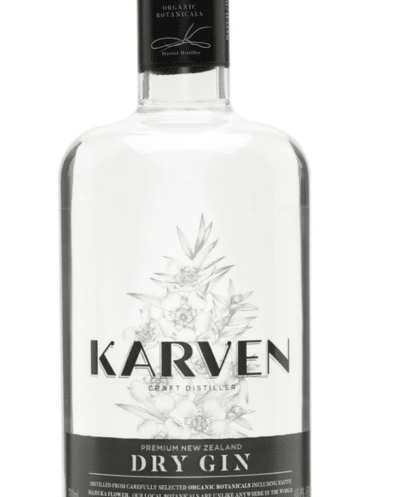The aromatic Manuka Flowers, Karven Dry Gin’s signature botanical, are best known for their aroma by way of bees, The honey from bees that pollinate the flower is well known for its distinctive aromatic qualities. These flowers are just one of four signature, New Zealand botanicals in this gin that come from the orchards surrounding the distillery.
Three other, less local botanicals round out the bill.
Karven Dry Gin is distilled in very small batches at the entirely solar powered Puhoi Organic Distillery, just north of Auckland. It is distilled by hand using what is described as a “gravity flow” process.
Tasting Notes
Aroma: Piney juniper, and menthol-kissed citrus. Lemon myrtle shows nicely here.
Flavor: Somewhat sweet flavor profile with a light mouthfeel. Marmalade and tangerine early through the mid-palate. Mid-palate, dusty, but sweet peppery notes, suggestive of pink peppercorns. Slight hint of cinnamon comes on late, lending a gentle red candy with a hint of jasmine.
Karven Dry Gin takes the palate on a long journey from citrus, through spice to floral. Complex and evocative.
Finish: Medium length and light, it has hints of rose hip and jasmine.
Cocktails
Karven Dry Gin is quite contemporary in approach, and should be treated as such behind the bar. The long evolving journey makes it ideal for a Martini. Pair it with an olive for a nice counterpoint.
In a gin and tonic that nice sweet citrus comes through but its overpowered by the bitterness. Try it in a gin and soda to retain some of that long evolving complexity.
While a tough mixer because of its changing palate, I suggest pairing it with floral ingredients that will concentrate a bright floral note early. Think a moonlight cocktail or an aviation cocktail.
Overall, Karven Gin
Karven Gin is a citrus-forward gin with nice complexity and an evolving palate. It’s a tough, and somewhat shy mixer, but playing to its citrus and floral strengths will accentuate the spirit.
Fans of classic style gin will find it a bit light on the juniper. While present, it’s a lost opportunity, because this gin would be even better with some, darker, terpey pine notes for balance.

